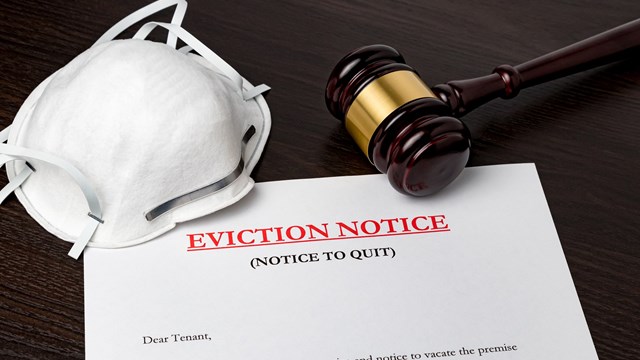In a real ad posted on craigslist, a popular website for free classified ads, someone is looking to rent out their 22nd Street apartment in Manhattan. It’s a 625-square-foot, one-bedroom apartment with a doorman, air-conditioning, laundry room and more. No pets are allowed in this apartment. It doesn’t say why this person wants to sublet—it could be because he is traveling for an extended period of time, or perhaps he has been relocated due to his job, but he needs someone to move in and continue the payments and care of his dwelling.
In the fictitious apartment down the street, in-laws have come to visit and—fortunately or unfortunately depending on your family—they need to extend their visit. Anyone who’s lived in New York City for any amount of time knows all-too-well this out-of-town-guest phenomenon. Given the expense of hotels and even the desirability of New York City as a tourist destination, New Yorkers are accustomed to having family, friends and guests in their apartments several weekends each year—sometimes even more frequently than that.
It’s also common for apartment-dwellers who plan to be out of town for awhile, like the craigslist poster above, to sublet their units as a money-making (or money–saving) strategy. Find a student, a recently transferred worker, or a tourist on an extended vacation—someone who’s going to pay the same, or more, for your unit while you’re away—and, when you come back, it’s still yours.
A Growing Trend
“Subletting is more common today because residents are becoming more transient than they were before—mostly because of jobs,” explains David Berkey, a managing partner with Gallet Dreyer & Berkey LLP, a law firm in Manhattan.
However, while subletting seems like a straightforward, congenial opportunity between tenant and subletter, unfortunately not all buildings — co-op, condo or rental—are so amenable, or look kindly upon long-term guests and sublets. To fully understand the dynamic however, it’s important to first differentiate between a guest and a sub-tenant.
“Most leases and many condo bylaws have provisions that an owner can have a guest in the apartment for a period of up to 30 days,” explains Berkey. “If they want to reside in the apartment after 30 days, they have to get written consent of the board.”
“Boards don’t like subtenants because they aren’t co-op owners,” says Robert Mayer, an attorney with Mayer & Glassman Law Corporation in Los Angeles and the author of How To Win Any Negotiation Without Raising Your Voice, Losing Your Cool, Or Coming To Blows.
“They don’t have the same concerns that owners have for common areas or the individual units—just as we may be less careful about where we put our luggage and our feet in a hotel room than in our own home. Subtenants may also care less about their neighbors, so they are less respectful and crank up the sound on the stereo at 2 a.m., or cook foods with strong noxious odors that permeate the halls.”
To curb potential problems, cooperative boards may impose limitations on subletting. “Cooperative boards usually retain the right to approve or disapprove a prospective subletter—just like they reserve the right to approve a sale,” says Neil B. Garfinkel, Esq. of Abrams Garfinkel Margolis Bergson, LLP in Manhattan and residential counsel to the Real Estate Board of New York (REBNY). He adds that boards may also limit the amount of sublets that are allowed in the building at any one time. Shareholders may also only be allowed to sublet one time in a three-year period.
Unfortunately, when it comes to co-op subletting, the elephant-in-the-room is the reality that many residents do not sublet legally. They may find a sub-tenant—maybe a friend or family member, or someone found through the apartment-seeking grapevine—avoid the required board approval, and downright lie when asked about the tenant and the location of the shareholder.
As a result, some co-op buildings even forbid subletting outright on the grounds that it’s a security risk and can sometimes undermine the character of the building community.
Read the Fine Print
The regulations and process—including fees—for subletting in a co-op are outlined in the proprietary lease, so read the fine print to know what your co-op expects.
“For example,” says Richard Krauss, a partner at the law firm of Ganfer & Shore, LLC in Manhattan, “in order to pay the increase in fuel costs or other charges, those buildings that allow subletting, may charge 10 percent of the first year’s rental as an administrative fee, or a flat fee. Some buildings don’t charge at all, and others may not even have a set policy, but just review applications on a case-by-case basis.” Krauss points out however, that subletting regulations in condos are different because residents own their apartments and can rent to anyone they choose.
In addition to the proprietary lease, there must also be a written sublease agreement between the shareholder and the tenant.
“Generally, the policy would include the number of people occupying the unit,” says Mayer. “You don’t want 10 college students or two families living in a two-bedroom unit. It also includes a method for dispute resolution, such as arbitration—this usually comes up when the lessee claims the security deposit for damage done and the sub-lessee claims ‘I didn’t do it!’ or ‘normal wear-and-tear.’ The usual policy addresses pets, noise, cooking odors and smoking. It outlines what alterations—like painting, building in shelves, room dividers, et cetera— can be made. If approval is granted [for an alteration], it’s often conditioned upon the sub-lessee’s restoring the premises to their original condition if the lessee so desires.”
The agreement between shareholder and sub-tenant must also state the amount of money the shareholder is charging. This can be more money than what the shareholder is currently paying, but the board must be made aware of this.
(FYI: For apartment rentals, the NYC Rent Guidelines website (www.housingnyc.com/html/resources/attygenguide.html) states that “tenants with leases who live in buildings with four or more apartments have the right to sublet with the landlord’s advance consent. The landlord cannot unreasonably withhold consent. If the landlord consents to the sublet, the tenant remains liable to the landlord for the obligations of the lease. If the landlord denies the sublet on reasonable grounds, the tenant cannot sublet and the landlord is not required to release the tenant from the lease. If the landlord denies the sublet on unreasonable grounds, the tenant may sublet. If a lawsuit results, the tenant may recover court costs and attorney’s fees if a judge rules that the landlord denied the sublet in bad faith.” Visit the website for more information on subletting a rental.)
If the co-op board comes back with an applicant rejection, Berkey explains that the shareholder can appeal to the other shareholders to overturn the decision. “Usually it requires two-thirds of the others shareholders to approve, but that’s almost impossible to get.”
Sub-Concerns
Even with an approved sub-tenant, there is always the potential for problems. Management will generally step in to try and rectify any problems, but if that does not work, they will notify the shareholder.
“They can contact the shareholder and tell them that it could result in the shareholder’s termination of the proprietary lease—the shareholder would then have to force the sub-tenant to abide by the provisions or get out,” says Berkey.
If it’s the sub-tenant with the concerns, he must address his concerns to his shareholder/landlord, who then will approach the board. A sub-tenant cannot attend a shareholder meeting.
“Ordinarily, a sub-tenant would not be able to take a problem or issue to the board like other shareholders,” says Garfinkel. “One instance where the board might consider dealing with a sub-tenant is where the shareholder has stopped paying maintenance. In that circumstance, the board may seek to collect the maintenance directly from the sub-tenant.”
The best way to by far to handle the subletting process is to be honest. It’s also the best way to protect yourself and your neighbors. Notify the doorman if you have a guest that is staying for more than a day or two—especially if they are required to sign in and out at the front desk—and don’t try to sneak around your building’s rules and regulations.
You can utilize various websites to find someone to sublet your apartment or you can go through a real estate agent or broker. Regardless of what method you choose, notify your board, complete all necessary paperwork and go through the approval process the right—and legal—way. This will prevent you from being caught up in legal battles—and possible eviction—if your shady ways are exposed.
Lisa Iannucci is a freelance writer living in Poughkeepsie, N.Y.







Leave a Comment